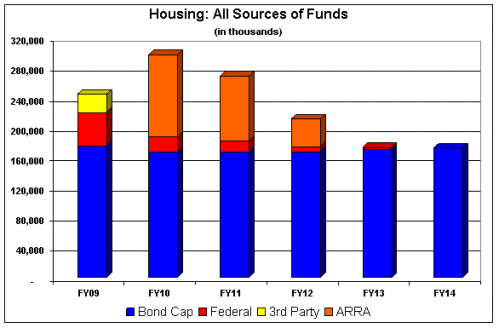
State spending for housing in Massachusetts includes both state-supported public housing and private affordable housing development. The Commonwealth’s state-supported public housing is a unique and valuable resource, consisting of more than 50,000 units in 242 cities and towns. The state’s public housing portfolio supports some of our most vulnerable citizens and includes more than 32,000 units of housing for the elderly, 12,900 units for veterans, and 2,000 units for clients of many of the state’s human services agencies – in all, providing homes for more than 80,000 residents. The portfolio suffered neglect for the 16 years prior to this Administration assuming office, resulting in an inherited backlog of expired building systems and significant components that need replacement. As a way to offset the negative effects of the high costs of private housing in Massachusetts, both for renters and owners, the Commonwealth’s private affordable housing development programs use a variety of financing resources, ranging from grants and loans to tax-credits, to support the production and preservation of affordable private housing.
The following graph reflects the Administration’s estimated capital investment in affordable housing over the next five years, as compared to projected fiscal year 2009 affordable housing-related capital spending.

Highlights of the fiscal year 2010 capital plan for housing and representative projects are presented below:
$99.4 million (including $5 million through the Affordable Housing Trust Fund and $12.5 million in ARRA funds through the Weatherization Assistance Program) invested in public housing. Continuing Governor Patrick’s commitment to public housing, this is an 89% increase in funding for public housing compared to funding levels prior to the Patrick-Murray Administration. In addition to these investments through the state capital budget, the Administration intends to continue to leverage affordable housing tax credits to increase investment in public housing.
$81 million in total spending for various private affordable housing development programs, including $35 million from the Affordable Housing Trust Fund (which is net of the $5 million in the Fund statutorily dedicated to public housing), one of the Department of Housing and Community Development’s (DHCD) most flexible funding sources and a key means of supporting affordable home ownership and affordable rental housing.
Examples of projects managed by DHCD during FY10 include:
The Housing Innovations Fund will provide a $750,000 investment in a critically important mission-oriented project in Boston’s South End. Pine Street Inn, in partnership with the Archdiocese of Boston, will develop a 37-unit single room occupancy project for homeless adults.
The Community Based Housing program will fund $5 million of investments to renovate affordable rental apartments for disabled individuals living on their own or with their families.
A $1 million investment will be made through the Community Improvement & Preservation Fund in Charlton to preserve affordable housing units. Fiscal year 2010 is the first full year of DHCD implementation of a $4 million flagship preservation award from the MacArthur Foundation to support projects such as Charlton.
$822,150 from the Housing Stabilization Fund will be invested in the Alaska Street project in Boston to support the acquisition and rehabilitation of single room occupancy housing for very low-income individuals including individuals making the transition from homelessness.
The Commonwealth has been awarded $241.6 million of ARRA funds for capital investments to support affordable housing under a few different programs.
In FY10, DHCD expects to spend $115 million of these ARRA funds. Of this FY10 amount, $85 million in the aggregate will be funded from (i) the Tax Credit Exchange Program to exchange unused 2008 low-income housing tax credits and up to 40% of 2009 tax credits for affordable housing production subsidies and (ii) the Tax Credit Assistance Program to restart low-income housing tax credit projects that were stalled due the financial crisis.
Through the Weatherization Assistance Program, $24.4 million will be expended in FY10 to aid homeowners and local groups’ efforts to make homes more energy-efficient, including investments in the Commonwealth’s public housing stock referenced above. In addition to these ARRA amounts for affordable housing reflected in this Housing investment category, is the Community Investment category includes $6 million of ARRA funds in FY10 from the Community Development Block Grant program to support housing-related community development activities.
The Commonwealth has applied for a grant under the Neighborhood Stabilization Program. These ARRA funds will be applied to the acquisition and rehabilitation of foreclosed and vacant properties in the neighborhoods hardest hit by the foreclosure crisis. This funding supplements the existing Neighborhood Stabilization Program which was created and funded by Congress last year, and for which the Commonwealth received $43 million.